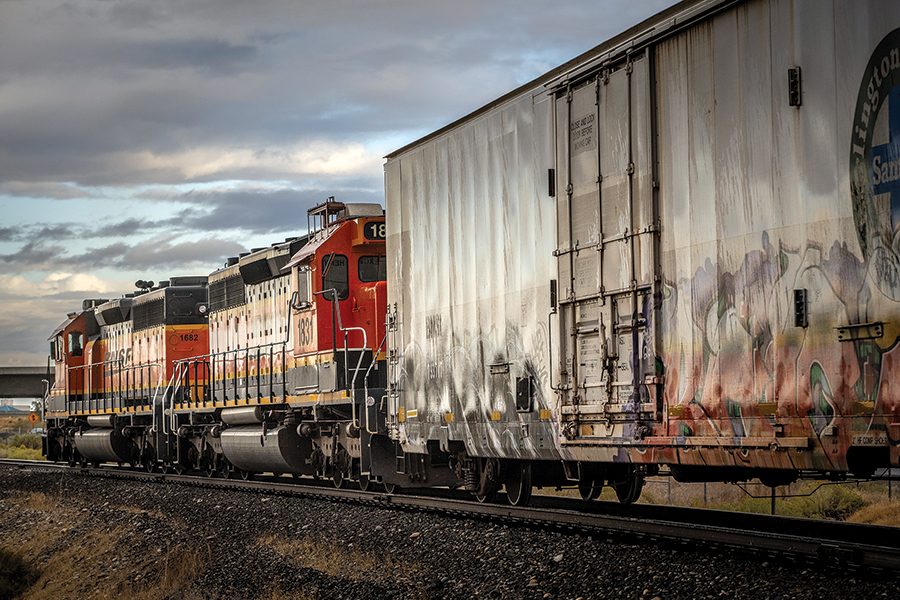
Home » Port of Benton: Rail priorities keep port on the right track
Port of Benton: Rail priorities keep port on the right track

About 1.3 million tons of cargo is shipped yearly out of Richland on the Port of Benton’s short line rail, making it the second largest tonnage for a short line in the state.
Photo by Scott Butner PhotographyOctober 11, 2023
After years of successful legislation to regain control of its local railways, the Port of Benton spent the last year repairing the rails so it could shift its priority to leveraging this asset to its fullest capacity: providing access for rail customers currently in Richland’s Horn Rapids area along with lucrative future investors.
Most recently completing a railroad tie replacement project, the port now has plans to invest $3.7 million in work on rail crossings and track maintenance at Highway 240, Airport Way and Saint Street in the upcoming year.
“We continue to look for additional federal grant funding to fully support the rail,” said Diahann Howard, executive director for the Port of Benton. “The funding would be another enhancement that would further get our rail stabilized and make more projects go forward.”
The 16 miles of short line rail owned by the port, called the Southern Connection Rail Line, remain a critical part of the local economy in that “both Class I’s (BNSF Railway and Union Pacific) serve customers directly and it drives competition,” Howard said. “It’s a very, very positive thing.”
About 1.3 million tons of cargo is shipped yearly out of Richland on its short line rail, making it the second largest tonnage for a short line in the state.
“It shows the significance of the value-added agriculture industry that’s already predominant here in Benton and Franklin counties,” Howard said.
Railroad crossings that intersect with vehicle traffic continue to see enhancements to make them smoother and to move the rail cars through faster, lowering the wait time for vehicles and enhancing overall safety.
“Additional projects we hope to bring include us working toward quiet zones, to limit the impact to the surrounding community,” Howard said. “We want to ensure we have a robust, safe and reliable system because so many of our clients and industries depend upon this, and they will be able to grow and expand if they are able to get their products onto the rail and through the gateways, to the east, or wherever their final destination is.”
Howard pointed out this efficiency helps ensure the industry’s success, which can translate to local jobs, “the ultimate success story.”
A Port of Benton asset since 1998, the rail line is part of an overall $90 million in assets held by the port. The port covers 2,756 acres and growing, along with two regional airports, and a proposed annual budget around $15 million.
2 airports
The port operates both the Prosser and Richland airports, and recently invested $3.2 million on improvements at the Richland Airport, including an extensive lighting project. Similar updates are expected in Prosser beginning in the spring, with an overall project value around $1.5 million.
One of the Richland Airport’s biggest customers is Life Flight Network, and Howard said the site’s master plan is positioning the airport at Terminal Drive for more general aviation, including growing its corporate customer base.
“More businesses might have an aviation need or they’re possibly more advanced manufacturing or even in related aerospace corporate companies. We’re looking for that growth to occur, and that all ties into the bigger vision we all have in the region for advanced manufacturing and clean energy,” she said.
Clean energy
One of just a few ports in the nation authorized to handle nuclear waste, spent fuel and radioactive materials, the Port of Benton is administering a grant from the state’s Department of Commerce to facilitate the growth of projects related to nuclear energy as part of its VERTical Innovation Cluster, with the “vert” implying green, or clean, energy.
The goal is to “drive innovation, solve challenges that limit the industry’s growth and pursue market opportunities,” Howard said.
Together with the city of Richland, the port is marketing the Northwest Advanced Clean Energy Center, a 1,641-acre site intended for industrial, manufacturing and research companies in need of parcels exceeding 200 acres.
“The open industrial property is going to be further multiplied, and we are a great location logistically for value-added advanced manufacturing users to be located here and supporting our existing agriculture,” Howard said.
Excitement exists around a huge potential landowner, Atlas Agro, a Switzerland-based company that proposed building a $1 billion zero-carbon fertilizer plant on 150 acres of port land in the North Horn Rapids Industrial Park.
The project isn’t a done deal but Atlas is moving forward on its feasibility study.
“We’re thrilled to report our front-end engineering design study is progressing as planned and set to conclude by the end of this year,” said Dan Holmes, president of the North American division of Atlas Agro.
The city of Richland plans to build new sewer infrastructure to expand the industrial park, a move that will support the potential plant. The state Community Economic Revitalization Board approved a $4 million low-interest loan for the work.
By barge
Howard said the port also is completing work around its barge slip and high dock as part of the effort to bring Atlas to Richland.
“We just want to make sure our assets are ready to serve those levels of industrial companies going forward and that ties to the overarching effort we have been leading to secure the supply chain around advanced nuclear reactors,” she said.

“Our collaboration with the Port of Benton, city of Richland, Pacific Northwest National Laboratory and Tri-City Development Council (TRIDEC) has been instrumental in resolving logistical and operational challenges at the site,” Holmes said. “The synergy between these organizations has been invaluable, and we’re particularly excited about the barge and rail access they’ve facilitated.”
Reflecting on growth
The port celebrates its 65th anniversary on Nov. 4 and the milestone has given leaders the chance to reflect on some of the growth and impact of the district that now covers two-thirds of Benton County, including Benton City, Prosser and part of Richland.
The port cites 10,000 jobs as being supported directly and indirectly by companies within its boundaries, which generate $564 million in revenue yearly.
Driving economic growth in Prosser is another key initiative, with the port’s effort to keep building out its thriving Vintners Village, a project that now is in its second phase and still signing new tenants, most recently Enodav Wine Co.
The village is a hub for wineries, restaurants and shopping, drawing regular, regional tourism, and the port has new ideas to pull additional visitors to the area.
“We’re working with vendors right now and in conversations with the (river) cruise lines about tour buses that can possibly come to the Prosser area weekly to increase that experience of farm-to-table,” Howard said.
The port also is citing its success stories in helping transfer assets to the private sector, pointing to the recent $1.7 million purchase of a former port-owned building on Logston Boulevard by its tenants, owners of Bombing Range Brewing and The Dive, which have expansion plans for the site.
“We think it was a phenomenal success seeing both of their businesses grow from startups to the building now for them to purchase and expand,” Howard said. “It’s really exciting and so is the potential for new jobs they’re bringing.”
The port has big plans for 2024, including the acquisition of the former commercial airport terminal at the Richland Airport Business Park using a $1.1 million low-interest loan. The building once housed a rental car facility and restaurant and was most recently used as an office building.
The port is planning a memorial for former sailors who served aboard the submarine USS Triton whose sail and conning tower are located at the port-owned USS Triton Sail Park. As part of the event, the port hopes to document sailors’ stories from Operation Sandblast, the first underwater expedition to circumnavigate the globe.
The port also may exchange industrial properties with the city of Richland, which could lead to the formation of an inland port focused on growth and expansion of the rail, and why this asset remains a key focus for all aboard.
“It could allow for a company to put their product on rail here in Richland and go directly to the ship in Seattle or Tacoma, creating import-export opportunities that could be leveraged right in north Richland,” Howard said.
Construction + Real Estate
KEYWORDS october 2023




